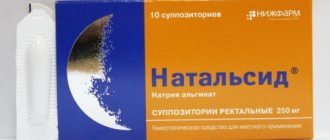The use of vaginal suppositories when planning pregnancy has different purposes. Some are prescribed to increase a woman’s fertility, others to eliminate inflammation, and others to get rid of the consequences of medical termination of pregnancy or surgery on the reproductive organs. Longidaza is applicable in all of the above cases.
Longidase is a protein, a macromolecular enzymatic complex classified as a proteolytic (protease). The main function of any protease is protein breakdown. It is thanks to this property that drugs with proteolytic activity, including Longidaza, help solve many problems related to diseases of the female genital organs, some of which lead to infertility.
Indications for use
When planning pregnancy, Longidaza is used only as prescribed by a doctor. The drug has a fairly large number of beneficial properties if taken correctly. For example, it potentiates and accelerates the processes of cleansing the body, enhances its immune response, due to the activation of humoral immunity.
Due to the binding of iron ions, which are activators of free radical chemical reactions, Longidase exhibits antioxidant activity. The active substance of the drug stimulates collagen synthesis and resorption of hematomas. The drug is low-toxic and is prescribed in the field of gynecology in the following cases:
- inflammation of the female genital organs;
- adhesions of the mucous lining of the uterus (synechia), including post-inflammatory ones;
- adhesions and scar processes of the pelvic organs formed after abortion, surgical interventions, which develop up to peritoneal infertility;
- total septic inflammation of the uterine wall (endomyometritis), including chronic;
- with tubal infertility, which is caused by dysfunction of the tubes.
More often there is a combination of several reasons. For example, tubal infertility is usually not considered separately, since in most cases it occurs together with peritoneal infertility. And for all the above disorders and their combinations, Longidaza is quite effective. Thanks to it, scar tissue becomes more elastic, inflammatory processes subside, and the functions of the woman’s reproductive system are restored.
Pregnancy is a strict contraindication to taking Longidase. And after a course of therapy with Longidaza rectal suppositories, several months must pass before the child is conceived.
Use of Longidaza suppositories
Adhesions formed due to untreated inflammation or artificial termination of pregnancy, although they lead to the development of persistent infertility, are not a death sentence. Russian medicine and pharmacology have made a breakthrough in their treatment by releasing the drug Longidaza in the form of injections or suppositories.
The main active ingredient of the drug is longidase - the synthesis of the enzyme hyaluronidase with a carrier substance. Its action is aimed at the treatment and prevention of adhesions. Also Longidaza candles:
- produce an anti-inflammatory effect;
- improve immunity;
- relieve swelling;
- promote tissue detoxification;
- have antioxidant properties.
A distinctive feature of Longidaza suppositories is that they act in a targeted manner - exclusively on tissues with pathological changes. The active substance does not accumulate in the body and is quickly eliminated from it.
Due to the high effectiveness and good tolerability of the drug, Longidaza suppositories are prescribed as part of anti-inflammatory therapy, as well as during rehabilitation after surgery.
By acting on hyaluronic acid, hyaluronidase helps soften adhesive scars, and elasticity returns to the tissues lining damaged organs. Scars become smaller or disappear.
When removing adhesions in the female genital organs or obstruction of the fallopian tubes, gynecologists prefer suppositories rather than Longidase injections. In their opinion, rectal suppositories act directly on the source of inflammation; the active substance penetrates scar tissue as quickly as possible. Sometimes physiotherapy in the form of electrophoresis or amplipulse therapy is prescribed in parallel.
Dosage regimen and warnings
Longidaza suppositories can be used both rectally and vaginally. The standard regimen is the administration of 1 suppository per day, preferably at night, and after two days on the third. The therapeutic course is 10 days. Then you need a second consultation with a gynecologist. In some cases, the patient may be prescribed maintenance therapy if necessary. The course of treatment can be repeated, but not earlier than 3 months after completion of primary therapy.
Before using the medication, you need to inform your doctor about the medications that the woman is already taking. Because when interacting with certain drugs, Longidaza partially loses its activity. This effect is observed when taking antihistamines, estrogens, products containing salicylates, and cortisone.
Some drugs can enhance the bioavailability of Longidase, and, consequently, the effect of its use. This should be remembered when using antibacterial and anesthetic agents, as well as diuretics.
Longidaza is a drug prescribed in gynecology for the treatment of inflammatory diseases and adhesions. Women of reproductive age can be prescribed Longidaza when planning pregnancy according to indications - the drug will not cause harm if used under the guidance of a doctor.
Taking the drug correctly
Suppositories are used vaginally and rectally. For rectal use, it is necessary to cleanse the intestines before the procedure. Vaginal suppositories do not require special preparation; the suppository is administered in a supine position before bedtime. The course and duration of treatment should be prescribed by the attending physician, depending on the problem:
- For gynecological purposes, the dosage most often prescribed is one suppository every three days. For therapeutic therapy, 10 suppositories are prescribed. If necessary, a second course of treatment is carried out after a while.
- In urology, suppositories are used rectally: 1 suppository every 2 days, treatment lasts 20 days. In the future, one suppository is administered every 3 days, with such an interval another twenty suppositories must be administered.
After the main treatment, a second course may be prescribed, but not earlier than three months later. In this case, one suppository is used per week, the course of treatment is from 3 to 4 months.
For frequent bleeding or kidney problems, the course of treatment is carried out using a gentle method, no more than one suppository per week.
You cannot increase the intervals and dosage on your own.
pharmachologic effect
The medicine is sold in pharmacies in the form of suppositories and powder in ampoules. Suppositories are rectal or vaginal. The powder in ampoules is used to prepare solutions for injections. One vial or ampoule contains 3000 IU (international units of activity) of longidase.
The active substance belongs to the group of immunomodulators - drugs that form and stimulate the immune response to external and internal stimuli and agents. In addition, the drug exhibits the following properties:
- antioxidant;
- anti-inflammatory;
- enzymatic.
Longidase is able to weaken acute foci of inflammation and regulate the level of mediators responsible for inflammatory processes. The drug increases the body's resistance to infectious diseases - systemic and local.
In gynecology, this drug is also used due to its antifibrotic properties. The active substance remains active at a temperature of 37 ° C for three weeks. By comparison, hyaluronidase, which is produced by the body to prevent fibrosis, will become inactive within 24 hours under the same conditions.
Longidase is capable of destroying connective tissue in fibrous formations, as well as inhibiting the synthesis of components for them. Studies have proven that the medicine does not damage healthy tissue, but only acts on areas of fibrosis.
The drug has a high safety profile and does not cause:
- allergies;
- mutations;
- uncontrolled cell division;
- toxic effect on the fetus.
Therefore, even when planning a child, Longidaza will not harm if a woman becomes pregnant while using the drug. But after this, it is important to consult a doctor as soon as possible regarding continuation of treatment with Longidase.
How is it used in gynecology?
The drug is prescribed for diseases that are accompanied by the proliferation of connective tissue. Longidase suppositories are used in gynecology for the following diseases:
- adhesions in the pelvis;
- inflammation of the genital organs;
- infertility due to obstruction of the fallopian tubes;
- intrauterine adhesions;
- chronic form of endometritis.
Treatment with Longidase is prescribed for interstitial inflammation of the bladder.
The drug becomes the first line of therapy for infertility in women. If the inability to conceive and bear a child is due to adhesions in the fallopian tubes, Longidaza for infertility will show results after several courses.
The action will be aimed at destroying fibrous formations in the fallopian tubes. Because of them, the egg cannot penetrate the uterus and connect with the sperm. After the resorption of connective tissue along the path of the egg, the patency of the tubes improves. Already in the next menstrual cycle during ovulation, you can try to conceive a child, if there are no other obstacles.
Longidaza is effective against adhesions in gynecology and in cases where they have formed on the uterus or ovaries. This often happens after:
- caesarean section;
- surgical interventions;
- acute inflammatory processes;
- chronic infections of the reproductive system.
For adhesions in the first stages, the drug will really be effective.
But if adhesions have formed long ago and in large quantities, surgery on the pelvic organs is prescribed. Removal of adhesions is carried out laparoscopically - an operation with minimal trauma, compared to classical surgery. Already during the rehabilitation period after surgery, the woman is prescribed a course of Longidase therapy. The drug will help heal scars faster and also prevent the formation of adhesions in the future.
In gynecology, suppositories with Longidase are also used for endometriosis. Endometriosis is a pathological growth of the mucous membrane that lines the inner cavity of the uterus. This tissue is the endometrium. It is needed to attach the fertilized egg to the uterus with the further development of the child.
When the disease occurs, the tissue begins to grow more than is required by the menstrual cycle. Endometriosis can affect the uterus, cervical canal, and abdominal cavity.
A suppository with Longidase stops the active inflammatory process and normalizes the process of cell division in benign processes. Typically, suppositories are used once a day, but the dosage regimen depends on the doctor’s decision.
In what cases is it prescribed when planning pregnancy?
When planning a child, it is necessary to provide all the conditions for proper development and lay the foundation for a future healthy organism.
To normalize reproductive function and prevent difficult pregnancy, the doctor may prescribe Longidaza suppositories when planning pregnancy. They will be indicated for the following diseases and conditions:
- adhesions in the fallopian tubes;
- adhesions on the uterus;
- chronic or acute foci of inflammation in the genitals;
- endometritis;
- cystitis;
- chronic vaginal dysbiosis.
Adhesions must be eliminated to ensure movement of the egg to the uterus. Inflammatory foci are dangerous because the fertilized egg will not be fixed for further development. Often with inflammation, ovulation does not occur at all.
Planning pregnancy requires treatment of chronic dysbiosis, if any. A shift in the balance of microorganisms towards opportunistic bacteria is accompanied by discomfort, itching, and unusual vaginal discharge with an unpleasant odor.
Under these conditions, the acidity of the vagina also changes. In this case, sperm cannot move normally to the egg, and the woman is more susceptible to an unstable cycle and infections. This makes it difficult to calculate ovulation correctly.
Longidase as an immunomodulatory drug will improve local immunity. The gynecologist will also recommend medications to restore beneficial flora, without which conception is impossible - the fertilized egg needs protection.
Pregnancy after longidase
Pregnancy after Longidase is possible no earlier than two months after the end of the course of treatment . Before planning a pregnancy, you should definitely visit your doctor.
Most women note a positive effect after using Longidaza suppositories - lost fertility returns to normal. In particular, the patency of the fallopian tubes improves, pain in the lower abdomen disappears, spotting from the vagina disappears, etc. Therefore, we can safely hope that after using Longidase, pregnancy will still occur.
Source womanjournal.org
Is Longidaza dangerous for the unborn child during pregnancy?
If a woman becomes pregnant after Longidaza and finds out about it later, there is no risk to the child. If you discover you are pregnant, you should stop using the drug. Only prolonged use during pregnancy can harm the baby.
Longidaza is often prescribed just so that a woman can become pregnant and give birth to a healthy baby, and use is stopped immediately after conception.
When planning pregnancy and using Longidase, tests should be carried out after the expected conception.
Longidaza suppositories during pregnancy
Longidaza suppositories should also not be used during pregnancy . Doctors use this drug to treat many gynecological diseases. According to the instructions, suppositories must be administered vaginally or rectally once a day. The course of treatment usually ranges from 10 to 20 days. For a number of diseases, the drug should not be used daily, but once every three days. A second course of therapy can be performed only after three months. It is worth noting that the effectiveness of Longidase can be reduced when taking antihistamines and hormonal drugs along with it. While antibiotics, anesthetics and diuretics, on the contrary, enhance its effect. This information is provided for women who are not pregnant. Longidase suppositories should not be used during pregnancy , and the child’s health should not be risked.
Contraindications and side effects
The use of Longidase is contraindicated in the following cases:
- acute infectious diseases;
- bleeding;
- hemoptysis;
- oncological diseases;
- tuberculosis and acute respiratory failure;
- acute kidney disease;
- age under 18 years;
- individual intolerance.
Adverse reactions rarely include pain at the injection site and redness of the vaginal walls after administration in the form of a suppository. Such effects disappear within two to three days. Allergic reactions are very rare. They manifest themselves as itching, urticaria, and anaphylactic shock.
To eliminate inflammatory processes and adhesions, gynecologists often prescribe Longidaza. Logngidase is also often prescribed when planning pregnancy. This drug may be prescribed for the treatment of other diseases if there are indications for its use. Longidaza can only be used as prescribed by a doctor.
Longidaza effectively fights adhesions, which has a beneficial effect on conception.
Reviews about candles
Table 1 lists reviews of people who used the drug Longidaza as prescribed by a doctor.
Source vselekari.com
The use of vaginal suppositories when planning pregnancy has different purposes. Some are prescribed to increase a woman’s fertility, others to eliminate inflammation, and others to get rid of the consequences of medical termination of pregnancy or surgery on the reproductive organs. Longidaza is applicable in all of the above cases.
Longidase is a protein, a macromolecular enzymatic complex classified as a proteolytic (protease). The main function of any protease is protein breakdown. It is thanks to this property that drugs with proteolytic activity, including Longidaza, help solve many problems related to diseases of the female genital organs, some of which lead to infertility.
How the drug works
There are 2 forms of release: in the form of suppositories and powder in ampoules. Suppositories are administered either rectally, after cleansing the intestines, or vaginally in a lying position. A solution is prepared from the powder for injection orally. One vial contains 3000 international units of active Longidase.
The main substance in the drug has immunomodulatory properties, i.e. it has a beneficial stimulating effect on the immune system. The active substance forms the body's response to various kinds of irritants and agents.
The product also has the following effects:
- Prevents damage to cell integrity.
- Eliminates inflammation.
- Saturates the body with enzymes.
Taking Longidase increases the body's resistance to infections.
The medicine also fights fibrous formations. The active substance is active for up to 21 days at a temperature of 37ºC. The hyaluronidase produced by the body has a much shorter duration of action. It will stop actively fighting fibrosis within 24 hours.
The drug acts only on fibrous formations, destroying them, without damaging healthy areas of tissue.
Longidaza does not have the following side effects:
- allergic reactions;
- cell mutation;
- uncontrolled cell division;
- negative impact on the baby in the womb.
The drug will not cause harm, even if conception occurs while planning a pregnancy. However, you will need to immediately inform your doctor about pregnancy in order to adjust the treatment.
Application of Longidase in gynecology
Gynecologists prescribe the drug for pathologies associated with the proliferation of connective tissue. Suppositories are used to treat many diseases.
Namely:
- Spike.
- Inflammatory processes.
- Impossibility of conception due to obstruction of the fallopian tubes.
- Intrauterine synechiae.
- Chronic endometritis.
Experts also prescribe Longidase for the treatment of interstitial cystitis.
If you want to know how Longidaza works, watch this fascinating video:
After the tumors are reabsorbed, the patency of the tubes becomes better. If there are no other health problems, you can plan to conceive in the next cycle.
Longidaza is quite effective in combating adhesions. This drug is also used for adhesions on the ovaries and for adhesions in the uterus.
Often adhesions occur due to:
- various operations on the genital organs;
- acute inflammation;
- old infections in the pelvic organs that have become chronic;
- caesarean section.
At the initial stage of the disease, Longidaza is quite effective. But if the problem has already become chronic, drug therapy may not help. In this case, surgery is prescribed.
Adhesions are removed using a modern method - laparoscopy.
Laparoscopy is a less traumatic type of surgery compared to the classical method. After getting rid of adhesions surgically, the rehabilitation period begins for the woman. After surgery, the doctor almost always prescribes Longidaza, since the drug helps scars heal faster and prevents the occurrence of new formations in the future.
To treat endometriosis, the drug is used in the form of suppositories. With endometriosis, uncontrolled cell division occurs, the tissue extends beyond the uterine cavity, affecting the cervical canal, abdominal cavity and uterus. Longidaza for endometriosis eliminates the inflammatory process and stops the growth of the uterine mucosa. As a rule, 1 tablet per day is used, but the doctor may prescribe a different dosage. The treatment regimen will depend on the extent of the disease.
Prescription of the drug when planning pregnancy
Planning a pregnancy is a very important stage for future parents. During this important period, it is necessary to ensure the creation of normal conditions for the development of the future baby so that he is born healthy. Doctors in some cases prescribe Longidaza in the form of suppositories when planning pregnancy to normalize the functioning of the reproductive system and prevent problems when bearing a child.
Candles are indicated for the following problems:
- Adhesive process in the fallopian tubes.
- The presence of adhesions on the uterus.
- Acute inflammation or chronic diseases of this type.
- Endometritis.
- Cystitis.
- Bacterial vaginosis in chronic form.
This is what Langidaza looks like in 3000 IU suppositories.
Adhesions are removed to improve the passage of the fallopian tubes needed to transport the egg to the uterus. Inflammation can prevent the fertilized egg from attaching to the uterus. Often, in the presence of inflammatory processes, anovulatory periods are observed.
When planning a conception, you also need to get rid of chronic vaginal dysbiosis. The proliferation of bacteria is accompanied by itching, an unpleasant odor, and unusual discharge. During the development of the disease, the acidity of the environment changes. Because of this, sperm activity decreases. The woman experiences disruptions in her cycle and develops infectious diseases. Irregular periods interfere with the correct calculation of ovulation.
Longidaza has a fairly beneficial effect on a woman’s immune system; the drug acts locally. You also need to follow the recommendations of the gynecologist and take medications to restore normal vaginal microflora. Beneficial flora will protect the fertilized egg from negative effects.
Taking Longidase during pregnancy
Even if conception occurred immediately after taking Longidase or during a course of treatment, there is nothing terrible about it for the child. As soon as a woman sees the coveted stripes on the test, the use of Longidase should be stopped. Only long-term use of the drug while pregnant can cause serious harm. Often the drug is prescribed specifically when planning a pregnancy, so that the process of conception occurs successfully, and after the attachment of the fertilized egg to the uterus, Longidaza is canceled.
If a woman is planning a pregnancy and takes Longidaza, she needs to monitor her condition by regularly doing pregnancy tests after the expected conception.
Reviews
Women's forums are often written by those who, as part of pregnancy planning, must undergo a course of treatment with Longidaza suppositories.
They are interested in the following questions:
- Is the drug really effective? Members of the forum say that just one course of using Longidaza suppositories helps remove small adhesions. On a repeat ultrasound, scars on the female genital organs, as a rule, are no longer detected. If they have decreased, but remain, you can re-install the candles after three months;
- How soon can you get pregnant after using the drug? The annotation for the suppositories states that their use is contraindicated during pregnancy due to the fact that there is no data on its effect on the fetus. Therefore, many women are afraid to try to get pregnant during a course of treatment with Longidase. Indeed, it is better to undergo the full course of treatment, make sure with an ultrasound that there are no interferences with pregnancy, and only then try to conceive a child.
When should you not use Longidaza?
Longidaza has contraindications. An experienced doctor should prescribe Longidaza. Self-medication can be very dangerous.
The drug should not be taken if:
- acute infections;
- bleeding;
- hemoptysis;
- malignant formations;
- tuberculosis, lung diseases;
- acute kidney problems;
- under the age of 18;
- existing individual intolerance to the components of the drug.
Contraindications
Longidaza suppositories are not always recommended for use. There are contraindications that should be taken seriously:
- breastfeeding period
- renal failure
- children under 12 years of age
- intolerance to any component, sensitivity to hyaluronidase
- hemoptysis
- cancerous formations
- pulmonary hemorrhage
- presence of hemorrhage in the vitreous body
If you have one of the listed diseases or conditions, it is important to stop using suppositories; in rare cases, they are allowed to be used, but under the strict supervision of a doctor.
Side effects
The drug has virtually no side effects. There have been extremely rare cases of redness at the injection sites or vaginal walls after insertion of suppositories. Typically, these side effects went away on their own within 1-2 days.
Allergic reactions in the form of itching, urticaria, and anaphylactic shock are also possible. However, such side effects are very rare.
Write in the comments why you were prescribed this drug? What side effects are you experiencing? Share your tips and experiences. Ask questions, our specialists will be happy to answer them. Don't forget to rate the article with stars below. Thanks for visiting, stay healthy!










